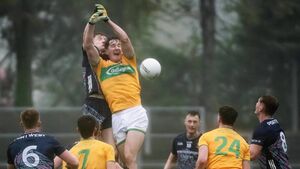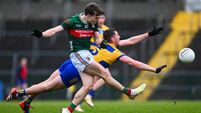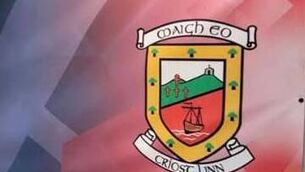McNulty kicked where Mayo still blink

Leitrim’s Barry McNulty beats Mayo’s Dylan Thornton to the ball. McNulty did his reputation no harm with a man of the match performance. Picture: INPHO/Evan Logan
Socrates once said, “The unexamined life is not worth living.” For that, he was sentenced to death, handed a goblet of poison for the crime of asking too many uncomfortable questions - proof, perhaps, that uncomfortable truths are rarely welcomed. If the old Greek had been in Carrick-on-Shannon on Saturday, he may have recognised a familiar kind of denial. Mayo, once again, took to the field and refused to question their uneasy relationship with the two-point arc, a part of the pitch they treat not as an opportunity, but as a theological dilemma. The ball goes in, the heads go down, and the play shifts sideways. There is reflection, but no revelation.
Meanwhile, Leitrim's Barry McNulty stepped into that space with clarity and conviction. He was the only man on the field who seemed to understand the opportunity associated with the new part of the game. The Leitrim midfielder didn’t tiptoe around the arc like a field of lambs wondering if the fence is electric. He took to it like a ram with a grudge - head up, horns out, and absolutely no fear of getting zapped. He wasn’t supposed to be the one dictating terms; then again, nothing about this semi-final followed the script.
Back in the league, the gulf between these teams was yawning. Mayo powered their way to the league final in Croke Park by topping the Division One table. Leitrim, meanwhile, endured a spring of grim results - no wins, one conceded fixture and barely a flicker of optimism.
This was supposed to be an administrative task for Mayo. A quick job, dry clothes, onto the Connacht final. Nature, alas, had other ideas. The rain came in angry waves, as if the clouds themselves had money on an upset. And the pitch began to resemble soup by the time McNulty started stamping his authority on the game. There hadn’t been weather like this in April since woolly mammoths roamed the province. And in those conditions, reputations mean nothing. While Mayo looked like they were dragging history and tradition behind them in a wheelbarrow, Leitrim moved with the lightness of a team that had already been written off.
Mayo had the names, the strength and conditioning stats. But Leitrim had the elements and a man who knew exactly how to use them.
Mayo did their best to start like a team with a plan. Mattie Ruane clipped over an eye-catching opener that hinted, briefly, at the return of a side with sharp ideas and boots to match. But from there, Mayo’s play grew predictable, safe and easy to smother. Leitrim dropped bodies, closed lanes, and waited - not out of fear, but because they knew of Mayo’s great reluctance: the shot from deep, the two-pointer, the risk that dares to be rewarded.
In the middle of the muck, McNulty stood up. He played like a man that was born for the conditions - sliding through tackles, making runs and calmly knocking over points while the world around him floundered in soggy frustration. Five of Leitrim’s seven first-half points came from his boot, including two two-pointers. The others were supplied by Darren Cox, who buzzed about like a lad who hadn’t read the script either.
Mayo, by contrast, were ponderous. They moved the ball wide and then wider again. When they finally took on a two-point attempt, via Ryan O’Donoghue, it curled wide. Worse again, it was just inside the arc. The maths didn’t make sense. The mindset made even less.
And then came the last act of the half. One last chance to stretch the lead before the break as the hooter blared. Colm Reape sent out the kick-out, giving Mayo a platform. But without pressure or any Leitrim body in the vicinity, Sam Callinan sent a hand-pass sailing into the abyss, meant for a runner who didn’t exist. It dribbled harmlessly over the sideline and the first half came to an end . It was the kind of moment that tells you everything without raising its voice. Mayo led 0-8 to 0-7 at the break.
McStay rang the changes at half-time - Diarmuid O’Connor, Eoghan McLaughlin, and Shairoze Akram were all sent in to stir something. Anything. O’Donoghue opened the half with a tidy point that settled things, but the calm didn’t last. McNulty - by now soaked, windblown, and completely undeterred - replied with an exquisite score off balance. From there, the game hung in a strange kind of standoff. No side could manage back-to-back scores. It was jab for jab, toe for toe. Mayo looked stronger, but not smarter. Then Stephen Coen wandered forward and tapped over the kind of simple score for which Mayo had been yearning. There were twenty minutes left. The shift had begun.
But McNulty wasn’t finished. With Leitrim sagging and tired legs giving way around him, he summoned one last moment - a third two-pointer, and this time from play.
Mayo eventually began to find space as Leitrim struggled to cover all the holes. Points came around the D, the kind of scores that settle matches but rarely say anything about a team’s potential. O’Donoghue finally took on a two-pointer that slid off the side of his boot and went well wide. It didn’t just miss; it discouraged. And you could feel the entire team sink a little deeper into their old ways.
By the end, the margin was seven. Mayo had won. But the only man who left Carrick-on-Shannon with a statement performance was wearing green and gold.
Mayo march on to a Connacht final but, once again, they looked like a team playing with one hand tied behind their back. Their reluctance to engage with the two-point arc is no longer a tactical quirk; it’s a liability. McNulty showed what’s possible when you back yourself from distance, when you trust your strike and ignore the weather, the odds and the history. He examined the game in front of him and responded with clarity.
Mayo are still staring at the questions and hoping they don’t come up on the day. If they want to compete with the big beasts later this summer, they’ll need to start thinking a little differently.
Socrates was punished for asking too many questions. Soon enough, Mayo might find themselves punished for asking none.




